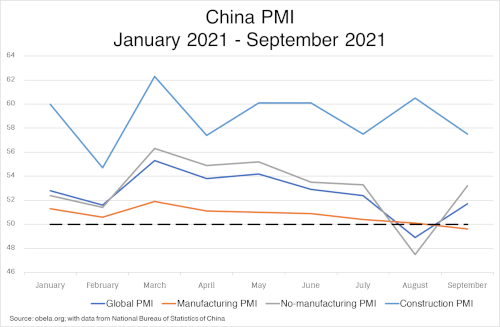The bankruptcy of Evergrande seems to be the most covered topic in the specialised press today. The media foresees an economic crisis in China. The default does not mean a world crisis, but perhaps a problem for the Asian country. So far, how is the Chinese economy doing in 2021, and are the signs of trouble already there?
China was the only large country to grow in 2020 and the first to control the COVID-19 pandemic. The Asian economy even eradicated extreme poverty in the same year. However, after months of recovery and growth, complications have already arisen.
China's GDP growth in 2020 was 2.3%, below the 6.5% average of the last five years, but close to the pre-pandemic rate of the West. In the second quarter of 2021, compared to 2020, it was 7.9%. The branches with the highest growth are IT (20.3%), transport (21%), retail sales (17%) and catering (29.1%). Comparing the quarterly growth, the fall caused by COVID-19 was 8.9% and had a recovery in the next quarter of 10%. However, the Chinese economy has not yet regained the growth pace of 2019.
Fixed asset investment in China is one of the main drivers of growth. From January to August 2021, compared to 2020, there was a growth in investment of 8.9%. Private investment increased by 11.5% and public investment by 6.2%. The sectors with the highest growth were: food processing (23.8%), information technology (24.9%), electrical machinery (21.3%), chemical industry (22.6%), health (26.5%) and manufacture of trains, ships and aircraft (30.2%). It is striking that these are the global value chains that China controls.
The gross value of the construction sector grew by 19% in the second quarter of 2021, compared to 2020. Government construction increased by 4% and private construction by 11%. With the bankruptcy of significant real estate companies, they could fall. The linkages to this sector are essential in any economy, and the Chinese economy is no exception. The economic spillover from building a building ranges from job creation to activation of the banking sector.
As the Chinese government does not plan to bail out large real estate companies, the economy will lose all the benefits of constructing buildings in the short term. It seems that it will be necessary for the Xi administration to intervene with a liquidity provision for those affected.
Meanwhile, the PMI index, which measures the macroeconomic outlook through business surveys, fell to 47 points in August 2021. When this index is below 50, there is a poor expectation of the economy in the short term for businessmen. What caused its fall was a poor outlook for new foreign orders and a problem with inventories in the manufacturing sector. International trade bottlenecks are a concern for the Chinese economy. The construction PMI is at 57.

International trade has not yet recovered from the pandemic nor the congestion in the ports. In China, the traffic of the largest ports had already been resolved by mid-September 2021, while the ports of California and Savannah in the USA remains congested with ships full of Asian goods. Increased trade should revive the world market everywhere. If only one party solves its problem, the value chains will not link up again, and the supply chain problem will continue.
Global trade problems could pose a risk for Latin America if the Chinese economy slows down. The primary market for Latin American raw materials is the Asian giant. If an economic crisis slows down the pace of consumption of Latin American inputs, prices will fall, affecting the region's balance of payments and growth.
The Chinese outlook is not entirely encouraging, but it is not as catastrophic as portrayed in the specialised press. The Chinese government and press seem more concerned with international trade and energy supply than the construction and banking sectors. The pace of growth is not yet back to the levels of two years ago, but China is still the fastest growing economy globally, with a forecast of 8% by 2021. The real estate bust may present a problem for the domestic market in the short term in terms of job losses, but experience shows that Xi's government will not let it drift.
Chinese businesspeople have a good outlook for the construction sector even with the Evergrande bankruptcy. The banking sector is not at risk because of the Chinese state's stake in the big domestic banks and the ease with which it can inject liquidity into them. Short-term problems are almost inevitable but manageable. The press has focused on a crisis trigger and does not foresee any other more immediate issues.









